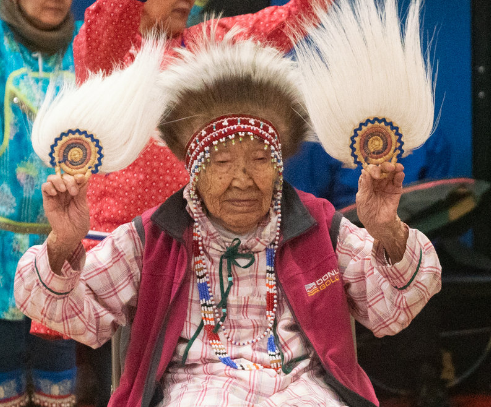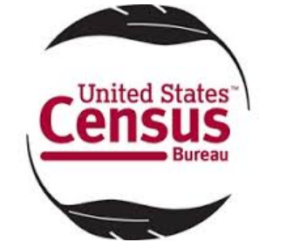
- Details
- By Levi Rickert
TOKSOOK BAY, Alaska — One day after celebrating her 90th birthday, Lizzie Chimiugak became the first American citizen to formally be counted in the 2020 Census on Tuesday.
Chimiugak, an Alaska Native was counted at her home in Toksook Bay, a remote Alaska Native village, was chosen by the Census Bureau as the first place in the United States to begin the official count that is mandated by the U.S. Constitution to occur every 10 years.
Census statistics are used to determine the number of seats each state holds in the U.S. House of Representatives and inform how billions of dollars in federal funds will be allocated by state, local, and federal lawmakers every year for the next 10 years.
After being counted, Chimiugak participated in a Native village dance ceremony. Villagers listened to a program that included the importance of being counted in the 2020 Census and to discuss climate change, another issue impacting Native Alaskan lives.

Toksook Bay is a village located on Nelson Island along the Bering Sea in southwestern Alaska. Census takers must get a head start in rural, remote areas like Toksook Bay when the ground is frozen and prior to the spring thaw, when residents leave to fish, hunt and seek out warm-weather jobs.
More than half of households on tribal lands across the country have nontraditional addresses where the Census Bureau can’t mail a census form. With no at-home mail delivery and a short window to respond before seasons change, receiving an invitation this way would be nearly impossible for remote Alaska residents.
That is why the Census Bureau worked with Alaska Native leaders to determine the best way to count people living on their lands. In Toksook Bay and other remote areas of Alaska, census takers will visit people at home and will fill out their questionnaires in person.
More Stories Like This
Native News Weekly (August 25, 2024): D.C. BriefsUS Presidents in Their Own Words Concerning American Indians
Lindy Waters’ N7 Homecoming Coincides With Nike’s Broader Native Youth Investment
US Senate Unanimously Recognizes November as National Native American Heritage Month
Navajo Council Focuses on Improving Senior Services, SNAP Access for Elders
Help us tell the stories that could save Native languages and food traditions
At a critical moment for Indian Country, Native News Online is embarking on our most ambitious reporting project yet: "Cultivating Culture," a three-year investigation into two forces shaping Native community survival—food sovereignty and language revitalization.
The devastating impact of COVID-19 accelerated the loss of Native elders and with them, irreplaceable cultural knowledge. Yet across tribal communities, innovative leaders are fighting back, reclaiming traditional food systems and breathing new life into Native languages. These aren't just cultural preservation efforts—they're powerful pathways to community health, healing, and resilience.
Our dedicated reporting team will spend three years documenting these stories through on-the-ground reporting in 18 tribal communities, producing over 200 in-depth stories, 18 podcast episodes, and multimedia content that amplifies Indigenous voices. We'll show policymakers, funders, and allies how cultural restoration directly impacts physical and mental wellness while celebrating successful models of sovereignty and self-determination.
This isn't corporate media parachuting into Indian Country for a quick story. This is sustained, relationship-based journalism by Native reporters who understand these communities. It's "Warrior Journalism"—fearless reporting that serves the 5.5 million readers who depend on us for news that mainstream media often ignores.
We need your help right now. While we've secured partial funding, we're still $450,000 short of our three-year budget. Our immediate goal is $25,000 this month to keep this critical work moving forward—funding reporter salaries, travel to remote communities, photography, and the deep reporting these stories deserve.
Every dollar directly supports Indigenous journalists telling Indigenous stories. Whether it's $5 or $50, your contribution ensures these vital narratives of resilience, innovation, and hope don't disappear into silence.
 The stakes couldn't be higher. Native languages are being lost at an alarming rate. Food insecurity plagues many tribal communities. But solutions are emerging, and these stories need to be told.
The stakes couldn't be higher. Native languages are being lost at an alarming rate. Food insecurity plagues many tribal communities. But solutions are emerging, and these stories need to be told.
Support independent Native journalism. Fund the stories that matter.
Levi Rickert (Potawatomi), Editor & Publisher

